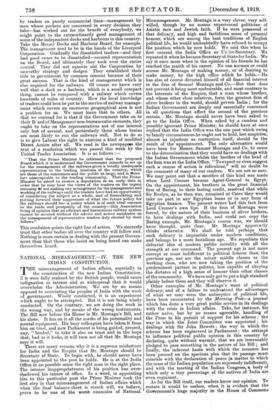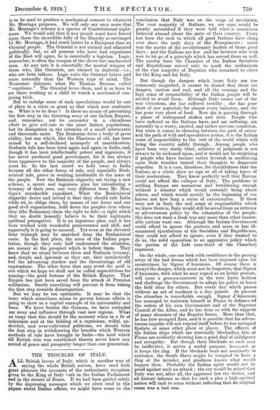NATIONAL MISMANAGEMENT.—IV. THE NEW INDIAN CONSTITUTION.
There are many reasons why it is a supreme misfortune for India and the Empire that Mr. Montagu should be Secretary of State. To begin with, he should never have been appointed to the post he holds. He is at the India Office in no possible sense the right man in the right place. The intense inappropriateness of his position has over- shadowed his tenure of office. In a word, in appointing him to this particular post the Prime Minister took the first step in that mismanagement of Indian affairs which when the final balance-sheet is struck will, we believe, prove to be one of the worst examples of National Mismanagement. Mr. Montagu is a very clever, very self- willed, though by no means experienced politician of Asiatic .race and Jewish faith. If he were possessed of that delicacy, and high and fastidious sense of personal honour, which are among the best traditions of English political life, he would undoubtedly have refused to occupy the position which he now holds. We said this when he first entered the India Office as Under-Secretary. We repeated it when he became Secretary of State for India. We say it once more when in 'the opinion of his friends he has reached the zenith of his career. No one accuses or could accuse Mr. Montagu of making money, or of desiring to make money, by the high office which he holds.—He has also of course divested himself of all financial interest in the firm of Samuel Montagu and Co.—But that does not prevent it being most undesirable, and most contrary to the interests of the Empire, that a man whose brother, and whose other close relatives, form the greatest firm of silver brokers in the world, should govern India ; for the Indian Government are deeply and essentially concerned in all questions that affect the second of the precious metals. Mr. Montagu should never have been asked to go to the India Office. When asked by a careless and possibly ignorant Prime Minister, he should have at once replied that the India Office was the one post which owing to family circumstances he ought not to hold, lest suspicion, almost as injurious as corruption itself, should be the result of the appointment. The only alternative would have been for Messrs. Samuel Montagu and Co. to come to the determination that they would have no dealings with the Indian Government whilst the brother of the head of the firm was at the India Office. " To expect or even suggest such a course of action is ridiculous," will no doubt be the comment of many of our readers. We are not so sure. We may point out that a sacrifice of this kind was made when Lord Cromer became Agent-General in Egypt. On the appointment, his brothers in the great financial firm of Baring, to their lasting credit, resolved that while Sir Evelyn, as he then was, remained at Cairo they would take no part in any Egyptian loans or in any form of Egyptian finance. The present writer had this fact from Lord Cromer's own lips. If the firm of Montagu were forced, by the nature of their business of silver brokers, to have dealings with India, and could not copy the Baring example, Mr. Montagu's course was, we should have thought, quite clear. Mr. Montagu apparently thinks otherwise. We shall be told perhaps that such delicacy is impossible under modern conditions, and belongs to a more fastidious age. We repudiate this defeatist idea of modern public morality with all the strength at our command. The present age is not more corrupt or more indifferent to political honour than. the previous age, nor are the minor middle classes or the working class, who are now taking the position of the predominant partner in politics, less capable of obeying the dictates of a high sense of honour than other classes of the community. We have only got to put a high standard plainly before them and they will observe it. Other examples of Mr. Montagu's want of political delicacy, and of a failure to undeistand the advantages of what we may term the antiseptics of political life, have been enumerated by the Morning Post—a journal which has done a very great public service in its dealings with the crisis in Indian affairs. Take, for instance, his rather naive, but by no means agreeable, handling of the Press in his pursuit of support for his scheme ; the way in which the Joint Committee was appointed ; his dealings with Sir John Hewett ; the way in which the scheme has been engineered in Parliament ; the attempt to influence political public opinion in this country by declaring, quite without warrant, that we are irrevocably pledged to pass something in the nature of his Bill ; and finally, the indecent haste with which the measure has been pressed on the specious plea that its passage must coincide with the declaration of peace (a matter to which the mass of the Indian population are supremely indifferent), and with the meeting of the Indian Congress, a body of which only a tiny percentage of the natives of India are even cognizant. As for the Bill itself, our readers know our opinion. To restate it would be useless, when it is evident that the Government's huge majority in the House of Commons is to be used to produce a mechanical consent to whatever Mr. Montagu proposes. We will only say once more that Mr. Montagu's scheme is a species of Constitutional night- mare. We would add that if any people must have forced upon them the incredible folly of the Diarchy as envisaged by Mr. Montagu, it had much better be a European than an Oriental people. The Oriental is not trained and educated politically, but, as all persons who have had experience of the East will agree, he is essentially a logician. Logic, remember, is often the weapon of the clever but uneducated man. At any rate it is essentially the mental weapon of those who, like Orientals, are trained in dialectic—i.e., who are born talkers. Logic suits the Oriental better and more naturally than the Western type of mind. The Westerner distrusts what Sir Thomas Browne called " ergotisms." The Oriental loves them, and is as keen to see them working as a child to watch a mechanical con- juring trick. But to indulge more of such speculations would be out of place in a crisis so great as that which now confronts us. What is to be done ? Is there no means of preventing the first step in the throwing away of our Indian Empire, and, remember, not its surrender in a chivalrous effort to give self-rule to the great Indian populations, but its dissipation in the interests of a small aristocratic and theocratic caste. The Brahmins form a body of great ability, but one which, like the Pharisees of old, has been ruined by a self-declared monopoly of sanctification. Brahmin rule has been tried again and again in India, and, though it has been intellectually potent and ingenious, it has never produced good government, for it has always been oppressive to the majority of the people, and always must be. In the last resort we hold sway in India because all the other forms of rule, and especially Brah- minical rule, prove in working intolerable to the mass of the people. Now the Brahmin oligarchy are trying a new scheme, a secret and ingenious plan for introducing a tyranny of their own, one very different from Mr. Mon- tagu's ramshackle expedient. What the Brahminical oligarchy desire and intend is that they should rule India while we, to oblige them, by means of our Army and our good civil organization, hold down the peoples over whom they (the Brahmins) claim the right to rule—a right which' they no doubt honestly believe to be their legitimate spiritual prerogative. It is an ingenious plan, and it has been worked with wonderful perseverance and skill, and apparently it is going to succeed. Yet even at the eleventh hour triumph may be snatched from the Brahminical caste. In the first place, the mass of the Indian popu- lation, though they only half understand the situation, are uneasy at the prospect which is before them. They know that we stand between them and Brahmin tyranny, and, simple and ignorant as they are, they instinctively feel the advancing shadow and the threatenings of old oppressions. The other force that may avert the peril is one which we hope we shall not be called superstitious for naming—the good fortune of the British Empire. That Empire has just been saved from the attack of Prussian militarism. Surely something will prevent it from taking the first step towards disintegration. But we may be too optimistic. It may be that the irony which sometimes seems to govern human affairs is going to show us a capital example of its universality and force. We have beaten the German, we have extended our sway and influence through vast new regions. What an irony that this should be the moment when in a fit of indecision and at the bidding of a capricious, wilful, un- decided, and over-cultivated politician, we should take the first step in withdrawing the benefits which Western methods of rule have brought to India—the land which till British rule was established therein never knew any period of peace and prosperity longer than one generation.















































 Previous page
Previous page